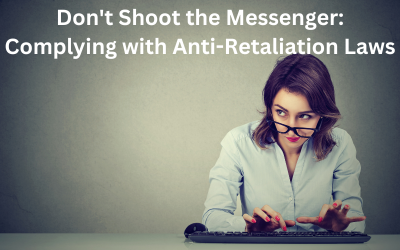Webinar: Don’t Shoot the Messenger: Complying with Anti-Retaliation Laws

- Date Recorded: September 19, 2024
- Length: 1 hour, 1 minutes
- Presenter: John Mills
- CE: eligible for 1 CE
- Price: $50.00 (Members get webinar for free)
Login | Join NBHAP
When the safety of patients is at stake, the law discourages heads in the sand. To the contrary, federal and state laws encourage employees and agents of healthcare organizations - and even their patients - to step forward and report quality of care concerns or potential noncompliance with laws and regulations. Under the law, even a "toxic" employee's petulant griping could constitute protected whistleblowing activity if it concerns patient care or billing payors.
Too often healthcare organizations fail to recognize whistleblowing activity and make missteps in their dealings with the putative whistleblower, even where the whistleblower's intentions are not pure. This can give rise to liability for unlawful retaliation. Numerous state and federal laws impose liability on organizations and their leadership when they take any adverse action against the person raising the concern if it can be shown that the adverse action would not have been taken but for the person stepping forward. In some cases, the law will presume retaliation if the adverse action occurs within a certain amount of time after the concern was raised.
This session aims to identify protected whistleblowing activity and provide participants with an understanding of the laws that punish retaliation so they can effectively improve patient care while not becoming victims of conniving opportunists.
Presenter

John Mills
John Mills is a partner at the healthcare law firm Leech Tishman Nelson Hardiman, LLP.
Navigating between regulatory compliance and litigation, the versatility of John's healthcare practice and the diversity of his clients provide him with a keen understanding of the unique business objectives and risks facing different segments of the healthcare provider community. He regularly advises clients on compliance with managed care and reimbursement programs, voluntary disclosures of possible over-payments, medical staff and peer review, and analysis of business arrangements to ensure compliance with the anti-kickback and Stark laws. John’s deep knowledge of regulatory compliance lends invaluable insight to his litigation practice, which includes managed care and reimbursement disputes, business disputes, and defense of fraud lawsuits and investigations.
Purchase/Access
In order to purchase any NBHAP webinar, you must be logged in for NBHAP and the Counselor CE Hub. Your login for both platforms is now the same, and it is free to create a login. Please contact us if you have any problems.

A national membership association that provides education and advocacy for those in the behavioral health and addiction treatment industries.
We are the leading and unifying voice of addiction-focused treatment programs.



